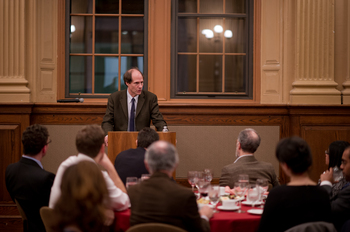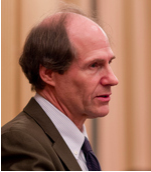
“The role of OIRA is emphatically one of procedural safeguards.”
I’m going to tell you a bit about the real world of the Office of Information and Regulatory Affairs (OIRA). And I’m just going to tell you facts. But it occurred to me as I looked over the remarks I had prepared that they have no ideas in them, so here are some things that are, if not ideas, at least quasi-ideas.
The first idea has to do with an oft-quoted statement by Felix Frankfurter about how the history of Anglo American liberty is in large part a history of procedural safeguards. I remember when I read that statement in law school, I wondered: How can the history of liberty be a history of procedural safeguards? They’re good, but they’re kind of boring.
The role of OIRA is emphatically one of procedural safeguards. That’s a first quasi-idea: OIRA sees itself as a guardian of what we might call regulatory due process. This little concept of regulatory due process means some kind of hearing for everybody: inside government and outside government, an opportunity to be heard. That’s the Frankfurtarian idea.
The second idea is from John Stuart Mill, and here I’m thinking both of Mill, the dedicated utilitarian, and of Mill, the sharp critic of Jeremy Bentham, the founder of utilitarianism. Mill believed in consequences, and specifically in making sure the consequences are as good as possible. But Mill said that his kind of intellectual father, Bentham, was like a one-eyed person who was blind in one eye and could see further than anybody else, but couldn’t see all the dimensions. In his great paper on Bentham, Mill said that there were qualitative differences among human goods. Bentham wasn’t alert to the love of beauty, the love of mystery, the love of nature, but Mill saw that these were qualitatively different from other kinds of loves. The utilitarian framework, understood in a certain way, would run over them and call these diverse goods “utility producers.” But if you love a beach or love a person or love money or love your job, it’s not as if these are all part of the same good called utility. There are qualitative differences among them. That was Mill’s critique of Bentham.
The Millian theme is captured in the idea of humanized cost-benefit analysis. What I tried to do at OIRA was to be, under the President’s leadership and guidance, very focused on making sure the benefits justified the cost—that is, that the monetized benefits justified the monetized cost, especially in an economically difficult time—but also to notice that some regulations involved goods, like the prevention of rape and the reduction of discrimination on the basis of disability, that couldn’t be adequately captured in monetary equivalents. Human dignity is actually called out in the President’s executive order on regulation. That’s completely original, and that is a Millian point. It is a fact that the net benefits of rules in the first three years of the Bush Administration were about $3.4 billion. That’s good: that’s in the black, not the red. Under Clinton, the net benefits were approximately $14 billion. That’s really good, and a lot of that comes from air pollution regulation. Under Obama, the net benefits after three years are in excess of $90 billion, which shows the intense focus on monetized benefits and monetized cost and a determined effort to make sure that if there is a costly rule, the benefits justify that rule.
It’s no accident that after the first three years of the Obama Administration, the highest-cost year in the last decade was 2007, under President Bush. Obama had not hit the Bush high, and, in fact, Bush II had the lowest high since the numbers have been recorded. Bush II’s high is lower than Clinton’s high, lower than his father’s high, and lower than Reagan’s high. And Obama hadn’t hit that. That’s connected with the Millian theme.
The third theme is Hayekian, after the great University of Chicago economist, Friedrich Hayek, who, I think, had one great idea. He had a lot of good ideas and one great idea. And the great idea is that knowledge is dispersed in society, and that government planners, however well motivated, aren’t going to know what people know. For Hayek, this idea was a critique of socialism and supported a plea for markets. He said the price system is a marvel because the price of a good aggregates information from lots and lots of people.
This is a great and true point, and what can be added is that while rulemaking can’t really beat the price system, it can incorporate the dispersed knowledge of lots and lots of people. One of the things I learned—I didn’t expect this at OIRA, but once I learned it, boy, did I take it as a fundamental part of my job—is that the rulemaking process depends critically,or even urgently, on the information provided by people outside of government. And that is a Hayekian point about dispersed knowledge and the central importance of incorporating it in the rulemaking process.




